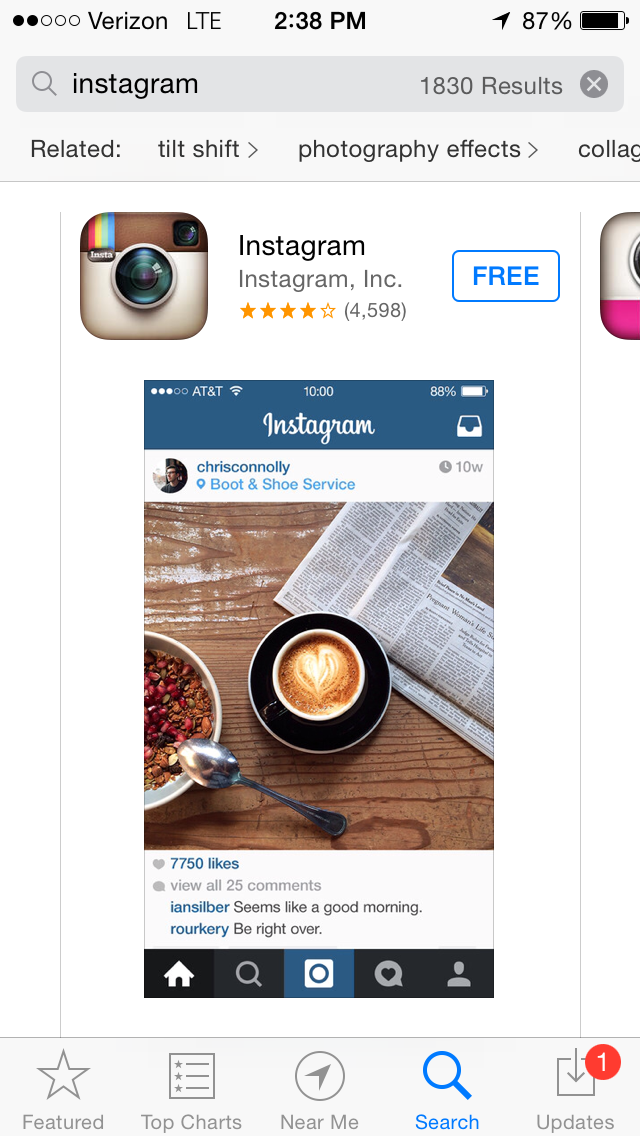



.




Rhetoric & Popular Phone Apps on College Campuses

.
.
.
Instagram is a photo sharing service and one of the most popular phone applications used on college campuses. Almost everyone I know either has an Instagram or knows someone with one. The purpose of Instagram is fairly simple: take pictures on your phone, put a filter on the photo or edit it or keep it as it is, then upload it to Instagram and all of your followers can see your picture (“FAQ”).
There is a lot of rhetoric associated with Instagram. One of the biggest issues with the photo sharing device is photo shop and photo editing. In fact, the phone app touts its photo editing filters as one of its unique features (“FAQ”). Everyone from famous celebrities to regular college students are known to retouch their photos in one way or another. That being said, it’s easy to see that the biggest rhetoric associated with Instagram is that people should join photo sharing networks like Instagram that come with filters and allow easy photo-editing because these networks can make you and your life seem either more beautiful or more interesting.
A recent blog post written by Jake Flanagin and published on The New York Times website shows how photo sharing can be used to “edit your life.” Along with talking about a young Dutch woman who used her Facebook pictures to convince her family that she was on a five week vacation in Southeast Asia when she was actually just doing photo-shoots in her Amsterdam home, Flanagin’s post talks about Keisuke Jinushi, a Japanese man who gained world-wide fame by editing his Instagram pictures to look like they were being taken by a lover, when really he was just taking them (Flanagin).
Jinushi said he started faking photographs when he realized that he wanted a girlfriend but didn’t have one (Flanagin). His misleading photographs gained him popularity online and are a good example of how Instagram can be used to make people’s life appear different from what they are like in reality. Jinushi claims that his experience with the fake photos gaining fame was very positive because it showed him that other people want a lover just as much as he does (Flanagin). Jinushi’s experience is a perfect example of how the rhetoric that Instagram can be used to make your life seem different can be positive. While Jinushi’s distorted photos were received positively, this is not always the case.
One famous celebrity constantly in the news for supposedly photo shopping Instagram pictures is Beyoncé. She has been accused of photo shopping multiple Instagram photos and most recently, she was accused of photo shopping her waist to appear slimmer while wearing a bathing suit (Ramisetti). Beyoncé’s photo editing has not led to positivity as has Jinushi’s, instead, the celeb’s supposed photo shopping may be contributing to a phenomenon known as “Instagram Envy.”
“Instagram Envy” is when users compare themselves to others that they follow on Instagram (Doyne). This envy can be attributed to the large amount of photo editing found on the network (Doyne). It may look like all your friends and famous celebrities that you follow are living glamourous lives or have the perfect bodies, but these things may not be real and may be the product of photo editing. This envy is the negative side of the Instagram rhetoric that the device can be used to make your life seem more interesting than what it is like in reality. While Instagram allows you to make your boring life seem amazing, it comes at the cost of making others feel insecure.
Works Cited
Doyne, Shannon. “Do You Have Instagram Envy?” The New York Times Company. 16 Dec. 2013. Web. 14 Nov. 2014.
“FAQ.” Instagram. Facebook. Web. 14 Nov. 2014.
Flanagin, Jake. “How to Fake Your Next Vacation.” The New York Times. The New York Times Company. 16 Sep. 2014. Web. 14 Nov. 2014.
Ramisetti, Kirthana. “Beyonce Accused of Photoshopping ’99 Problems’ Photo to Create Slimmer Waist.” The New York Daily News. The New York Daily News. 11 Nov. 2014. Web. 14 Nov. 2014.